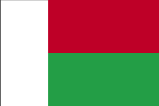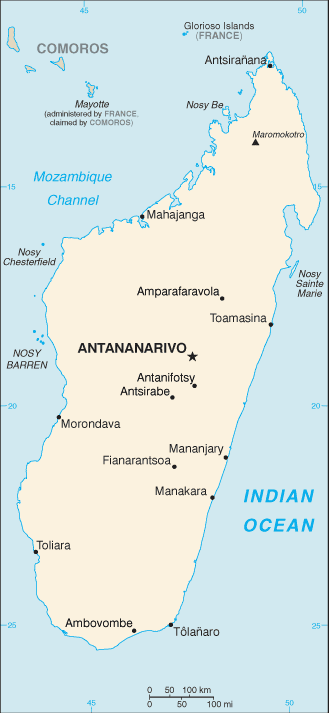|
Madagascar
|

|
Capital: Antananarivo
Population: 26,969,307
Brief History of Madagascar:
Madagascar was first inhabited by Indonesian seafarers during the first century AD. Tribal groups formed and today there are 18 different tribal groups. Some of the largest are the Merin, Betsileo, and Betsimisaraka.
In the 7th century, Arab traders arrived and built trading posts along the northwest coast of Madagascar. The first European to arrive was Portuguese Captain Diego Dias in the 1500s. Many years later the French established trading posts on the island. A strong leader from the Merina tribe united much of the island in the 1790s. In 1870 he came to an agreement with the British to abolish the slave trade. In return, the British would provide military and financial assistance. In 1885 the French made Madagascar a colony. The British, who were also heavily involved in Madagascar, agreed to this in return for control over Zanzibar. After World War II, Madagascar began to move towards independence. In 1960 it became a fully independent country.
The Geography of Madagascar
Total Size: 587,040 square km
Size Comparison: slightly less than twice the size of Arizona
Geographical Coordinates: 20 00 S, 47 00 E
World Region or Continent: Africa
General Terrain: narrow coastal plain, high plateau and mountains in center
Geographical Low Point: Indian Ocean 0 m
Geographical High Point: Maromokotro 2,876 m
Climate: tropical along coast, temperate inland, arid in south
Major cities: ANTANANARIVO (capital) 1.816 million (2009), Toamasina
The People of Madagascar
Type of Government: republic
Languages Spoken: French (official), Malagasy (official)
Independence: 26 June 1960 (from France)
National Holiday: Independence Day, 26 June (1960)
Nationality: Malagasy (singular and plural)
Religions: indigenous beliefs 52%, Christian 41%, Muslim 7%
National Symbol:
National Anthem or Song: Ry Tanindraza nay malala o (Oh, Our Beloved Fatherland)
Economy of Madagascar
Major Industries: meat processing, soap, breweries, tanneries, sugar, textiles, glassware, cement, automobile assembly plant, paper, petroleum, tourism
Agricultural Products: coffee, vanilla, sugarcane, cloves, cocoa, rice, cassava (tapioca), beans, bananas, peanuts; livestock products
Natural Resources: graphite, chromite, coal, bauxite, salt, quartz, tar sands, semiprecious stones, mica, fish, hydropower
Major Exports: coffee, vanilla, shellfish, sugar, cotton cloth, chromite, petroleum products
Major Imports: capital goods, petroleum, consumer goods, food
Currency: Madagascar ariary (MGA)
National GDP: $20,640,000,000
** Source for population (2012 est.) and GDP (2011 est.) is CIA World Factbook.
Back to Geography Home Page
